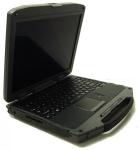Experts: Make sure rugged devices meet the needs of government employees who work remotely (with related video)
In this, the second part of a Government Product News interview, GammaTech’s Paul Kim, vice president of sales and marketing, and Mike Lehner, business development manager, discuss rugged computer applications in government. Go here for part 1 of the interview.
Fremont, Calif.-based GammaTech is an international manufacturer and supplier of notebook and tablet computers. The firm offers high-performance mobile computing solutions, including a line of rugged and hardened notebook and tablet computers.
GPN: Do you have any advice for government administrators on how to choose rugged tablets and rugged notebooks for employees working remotely?
Paul Kim (photo below at left) and Mike Lehner: Choosing a rugged device can be challenging. I believe the legwork must be analyzed before choosing a rugged computer. Things like features, size, ergonomics, and overall functionality and usefulness of the unit are very important.
 Most importantly, government managers should make sure that the notebook or tablet selected meets the needs of the end-user. The product selected should not have a lot of extra features that government workers will not use and will only add to the cost and weight of the unit.
Most importantly, government managers should make sure that the notebook or tablet selected meets the needs of the end-user. The product selected should not have a lot of extra features that government workers will not use and will only add to the cost and weight of the unit.
Government buyers should work with a rugged notebook or tablet manufacturer who is solution-based and willing to modify a commercial off-the-shelf (COTS) product to meet an agency’s specific needs. The vendor should not just try to sell you a “one-size-fits-all” computer that may or may not meet your requirements. I know this part can be challenging because of the nature of government contracts and bids.
All computers today have various remote capabilities; the challenge occurs in the level of security or legacy applications that need specific IT integration within the ecosystem.
In conclusion: All rugged computer devices are not created equal. While many on the market have similar specs, there are usually some significant differences between them that take careful analysis. Government buyers need to know what is required by their agency’s users to select the right device. 
When unique requirements arise, it is important to select a vendor that can provide the engineering support required, especially when there are conflicting requirements in the RFI and subsequent RFP. An engineering partner can assist you with determining what feature set can best meet your end user’s requirements. They can balance budget limits with the functionality, weight and other characteristics of the device. Another important consideration is the support life cycle of the product. Can the manufacturer support the product for a minimum of 3-5 years?
GPN: The GammaTech DURABOOK R8300 rugged notebook (photo below at left) has a lithium-ion battery that lasts up to eight hours. How important is long battery life and performance in a notebook or tablet used in the public sector?
 PK and ML: In most cases, longer battery life normally enables more versatility and a wide range of usage without the need of recharging. A typical usage day can be anywhere from 4 to 8 hours depending on the user. Our R8300 is at the higher end of this range based on input we have received from customers of the “real use time” they see in the field between charges. Since the battery is a significant portion of a tablet’s weight, we also took into consideration how many people use the tablets and the effort needed to carry them around. The R8300 boasts a 13.3-inch TFT LCD touch display with a sunlight readable feature. The unit is designed specifically for outdoor usage.
PK and ML: In most cases, longer battery life normally enables more versatility and a wide range of usage without the need of recharging. A typical usage day can be anywhere from 4 to 8 hours depending on the user. Our R8300 is at the higher end of this range based on input we have received from customers of the “real use time” they see in the field between charges. Since the battery is a significant portion of a tablet’s weight, we also took into consideration how many people use the tablets and the effort needed to carry them around. The R8300 boasts a 13.3-inch TFT LCD touch display with a sunlight readable feature. The unit is designed specifically for outdoor usage.
GPN: Thank you, Paul Kim and Mike Lehner, for your views.
This video outlines the rugged features ofGammaTech devices.
_____________
To get connected and stay up-to-date with similar content from American City & County:
Like us on Facebook
Follow us on Twitter
Watch us on Youtube




















